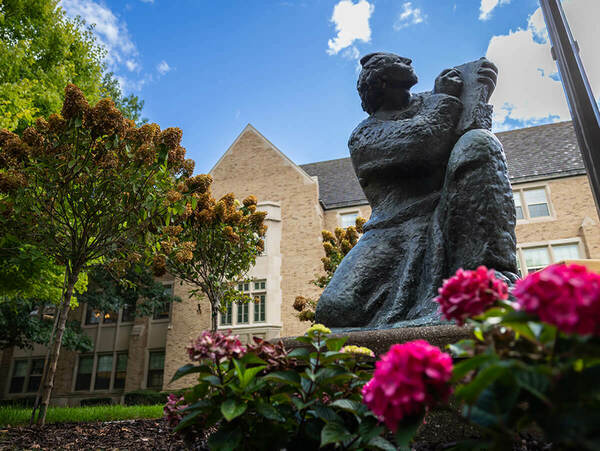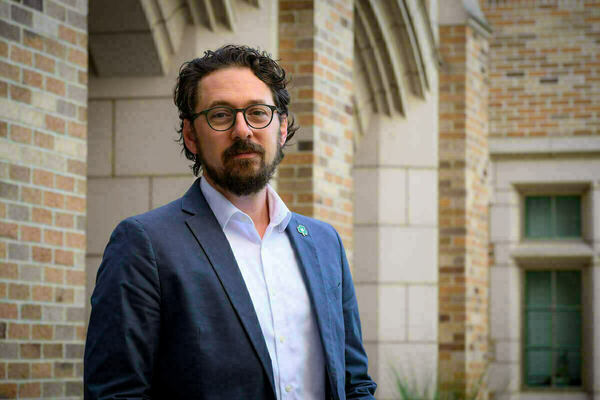Strategies to Incorporate Technology for Active Learning
I knew after completing my bachelor’s degree in molecular and cellular biology at the University of Illinois Urbana-Champaign that I wanted to pursue a Ph.D. My passion for learning biology stems from positive experiences I have had with both high school and collegiate faculty.
In gratitude for how so many instructors have inspired me, I decided that before starting my doctoral studies, I would spend a year teaching high school science. Little did I know when I accepted a position at St. Louis University High School (my alma mater) that COVID-19 would emerge and require a shift to technology-driven teaching strategies.
During the summer leading up to the fall 2020 semester, the question we faced was: How can we utilize technology to promote active learning rather than passive learning? From my experiences both as a student and a teacher, technology offers opportunities to effectively craft formative assessments both outside and within the classroom to provide a more active learning experience. With instruction primarily in-person now in the post-COVID world, incorporating technology gives instructors a creative edge to engaging tech-savvy Gen Z students, offering multiple ways to design these assessments and giving students timely feedback on their performance.
Outside the classroom, technology can enhance asynchronous learning. When I taught high school, a colleague introduced me to a video editing tool called Edpuzzle.1 Edpuzzle allows an instructor to take a video and incorporate questions or “checkpoints” to break the video into segments. It can be customized where students must answer these checkpoint questions or have the option to rewatch the segment before being able to proceed through the next segment. This is a great way to incorporate a formative assessment and can appeal to visual learners. For those who like to see a process in motion, such as mitosis, for example, students could be evaluated on how well they know each step of the cell division process. Or perhaps it can provide an opportunity for students to hear their foreign language instructor speak and be assessed on comprehension.
As most of my high school teaching involved Zoom, this tool was crucial for me to effectively evaluate remote learning. With instruction now since back to being in-person, video editing tools can still have a role in enhancing student learning. You may want to consider complementing an in-person lecture/discussion/lab with a virtual pre- or post-class formative assessment. This can give you an idea of how well students have prepared for the class and respond to your in-person teaching style.
Inside the classroom, whether in a small class or a large lecture, technology provides the benefit of allowing all students to actively participate, rather than just a small subset of students. As a TA for the Introductory Biology courses at Notre Dame, I have seen instructors utilize online polling software such as Slido1 to provide breakpoints in their lectures, giving students the opportunity to think individually or in groups before answering a multiple-choice question. The percentage of students who selected each choice can be displayed on the projector, allowing both students and the instructor to analyze that formative assessment.
When I was a student at Illinois, I experienced something similar. Some instructors experimented with iClicker devices, which I thought were greatly beneficial given that my introductory molecular biology class had over 600 students! Despite the very large class size, I still felt like I could actively participate, noting what questions I was confident in and ones where I struggled, which reminded me to stay on top of my learning.
If utilized well, technology can offer a win-win for both the instructor and student in various settings. I encourage you to reflect on how you can creatively incorporate technology into your course to create the best learning environment possible. If you're interested in exploring more options to bring technology into your active learning strategies, the Teaching & Learning Technologies (TLT) team provides a list of officially supported programs that are used across campus.
1 Edpuzzle and Slido are not officially supported by Notre Dame, but both are used across campus.
Matthew Fink is a graduate associate at Notre Dame Learning’s Kaneb Center for Teaching Excellence and is pursuing a Ph.D. in biological sciences at the University.
Originally published by at learning.nd.edu on September 20, 2024.
Latest Research
- ND research teams awarded funding to address sustainability challenges around the worldNotre Dame's Just Transformations to Sustainability Initiative has awarded funding to three cross-disciplinary faculty teams leading research on pressing sustainability issues—including forest conservation in the Amazon, watershed…
- Fighting to improve hurricane forecastsResearchers at Notre Dame are improving hurricane forecast accuracy, giving officials time to evacuate and protect residents. Read the article
- 2025 Naughton Fellowships awarded to four joint faculty projectsThe University of Notre Dame’s Naughton Fellowship program has announced its faculty awardees for the 2025-2026 cohort. Faculty from leading Irish universities and Notre Dame have come together to work on four research projects as a part of the Naughton Faculty…
- Notre Dame Law School Welcomes Four New Clinical Faculty Members for 2025–26Notre Dame Law School is pleased to welcome four new clinical faculty members for the 2025–26 academic year. “It is an honor to welcome such a distinguished group of clinical professors to Notre Dame Law School. Their impressive achievements and deep sense of vocation will enrich our academic…
- Six early-career scholars join the inaugural Provost’s Postdoctoral Fellowship Program.Six interdisciplinary scholars have joined the College of Arts & Letters at the University of Notre Dame to continue their research, obtain invaluable support, and engage in professional development as part of the inaugural Provost’s…
- Politics inspired Democracy Initiative managing director from early ageThis is the first in a series of features highlighting the managing directors of the University's strategic initiatives. The managing directors are key (senior) staff members who work directly with the faculty directors to help implement and operationalize the vision for the initiatives, oversee initiative staff, and serve as thought partners for the faculty directors.











